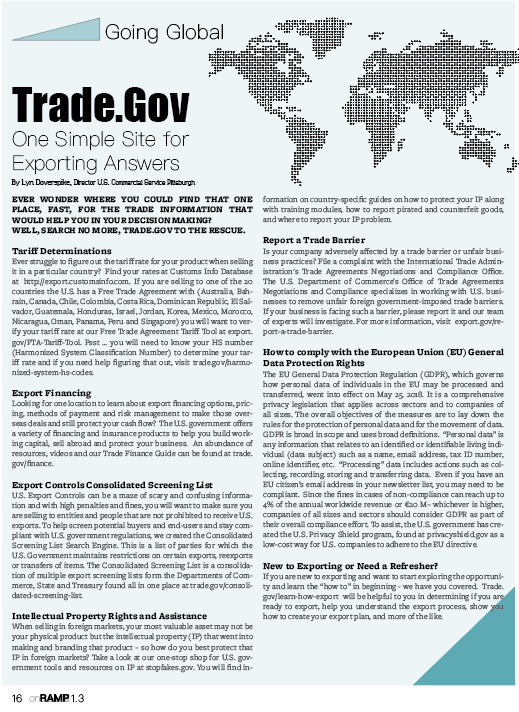TRADE.GOV Part 2: One Simple Resource for Exporting Answers
By Lyn Doverspike, Director U.S. Commercial Service Pittsburgh trade.gov/pennsylvania-pittsburgh
 Ever Wonder Where You Could Find that One Place, FAST, for the Trade Information that Would Help You in Your Decision Making? Well, search no more, trade.gov to the rescue.
Ever Wonder Where You Could Find that One Place, FAST, for the Trade Information that Would Help You in Your Decision Making? Well, search no more, trade.gov to the rescue.
Tariff Determinations
Ever struggle to figure out the tariff rate for your product when selling it in a particular country? Find your rates at Customs Info Database at http://export.customsinfo.com. If you are selling to one of the 20 countries the U.S. has a Free Trade Agreement with (Australia, Bahrain, Canada, Chile, Colombia, Costa Rica, Dominican Republic, El Salvador, Guatemala, Honduras, Israel, Jordan, Korea, Mexico, Morocco, Nicaragua, Oman, Panama, Peru and Singapore) you will want to verify your tariff rate at our Free Trade Agreement Tariff Tool at export.gov/FTA-Tariff-Tool. Psst … you will need to know your HS number (Harmonized System Classification Number) to determine your tariff rate and if you need help figuring that out, visit trade.gov/harmonized-system-hs-codes.
Export Financing
Looking for one location to learn about export financing options, pricing, methods of payment and risk management to make those overseas deals and still protect your cash flow? The U.S. government offers a variety of financing and insurance products to help you build working capital, sell abroad and protect your business. An abundance of resources, videos and our Trade Finance Guide can be found at trade.gov/finance.
Export Controls Consolidated Screening List
U.S. Export Controls can be a maze of scary and confusing information and with high penalties and fines, you will want to make sure you are selling to entities and people that are not prohibited to receive U.S. exports. To help screen potential buyers and end-users and stay compliant with U.S. government regulations, we created the Consolidated Screening List Search Engine. This is a list of parties for which the U.S. Government maintains restrictions on certain exports, reexports or transfers of items. The Consolidated Screening List is a consolidation of multiple export screening lists form the Departments of Commerce, State and Treasury found all in one place at trade.gov/consolidated-screening-list.
Intellectual Property Rights and Assistance
When selling in foreign markets, your most valuable asset may not be your physical product but the intellectual property (IP) that went into making and branding that product – so how do you best protect that IP in foreign markets? Take a look at our one-stop shop for U.S. government tools and resources on IP at stopfakes.gov. You will find information on country-specific guides on how to protect your IP along with training modules, how to report pirated and counterfeit goods, and where to report your IP problem.
Report a Trade Barrier
Is your company adversely affected by a trade barrier or unfair business practices? File a complaint with the International Trade Administration's Trade Agreements Negotiations and Compliance Office. The U.S. Department of Commerce’s Office of Trade Agreements Negotiations and Compliance specializes in working with U.S. businesses to remove unfair foreign government-imposed trade barriers. If your business is facing such a barrier, please report it and our team of experts will investigate. For more information, visit export.gov/report-a-trade-barrier.
How to comply with the European Union (EU) General Data Protection Rights
The EU General Data Protection Regulation (GDPR), which governs how personal data of individuals in the EU may be processed and transferred, went into effect on May 25, 2018. It is a comprehensive privacy legislation that applies across sectors and to companies of all sizes. The overall objectives of the measures are to lay down the rules for the protection of personal data and for the movement of data. GDPR is broad in scope and uses broad definitions. “Personal data” is any information that relates to an identified or identifiable living individual (data subject) such as a name, email address, tax ID number, online identifier, etc. “Processing” data includes actions such as collecting, recording, storing and transferring data. Even if you have an EU citizen’s email address in your newsletter list, you may need to be compliant. Since the fines in cases of non-compliance can reach up to 4% of the annual worldwide revenue or €20 M– whichever is higher, companies of all sizes and sectors should consider GDPR as part of their overall compliance effort. To assist, the U.S. government has created the U.S. Privacy Shield program, found at privacyshield.gov as a low-cost way for U.S. companies to adhere to the EU directive.
New to Exporting or Need a Refresher?
If you are new to exporting and want to start exploring the opportunity and learn the “how to” in beginning - we have you covered. Trade.gov/learn-how-export will be helpful to you in determining if you are ready to export, help you understand the export process, show you how to create your export plan, and more of the like.